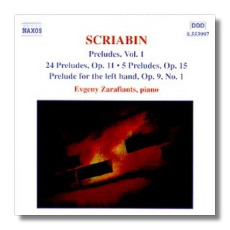
The Internet's Premier Classical Music Source
Related Links
- Scriabin Reviews
- Latest Reviews
- More Reviews
-
By Composer
-
Collections
DVD & Blu-ray
Books
Concert Reviews
Articles/Interviews
Software
Audio
Search Amazon
Recommended Links
Site News
 CD Review
CD Review
Alexander Scriabin

Préludes, Volume 1
- Prélude in B Major, Op. 2, #2
- Prélude in C Sharp minor, for left hand, Op. 9, #1
- Twenty-four Préludes, Op. 11
- Six Préludes, Op. 13
- Five Préludes, Op. 15
- Five Préludes, Op. 16
- Seven Préludes, Op. 17
Evgeny Zarafiants, piano
Naxos 8.553997 DDD 75:41
There are those who insist that Scriabin's music must be played with a mystical or ethereal approach, or with eldritch desperation, or at least with a sense for the futuristic. Certainly the composer was a visionary – rather an oddball visionary, at that – whose ideas on the confluence of the various art forms, as he envisioned in his unrealized Mysterium, were definitely advanced, if outlandish. But we must remember that his early compositions, which this Naxos issue addresses, were, if not conventional, at least not particularly revolutionary. Still, there are more than a few hints here of the composer's later, more experimental style.
Russian-born, Croatia-based Yevgeny Zarafiants, tackles these works with no illusions about their place or significance in the composer's oeuvre. He points up their kinship to Chopin and Liszt, but also captures their more portentous moments. Thus the tenderness and Chopinesque qualities in the Ninth (E Major) and Tenth (C Sharp minor) Préludes of Op. 11 emerge sensitively, the latter with hints of Rachmaninoff to come. And he plays up the weird thematic similarity in the First Prélude (C Major) of Op. 13 with the Chopin F sharp Nocturne, Op. 15, #1. Yet, he catches the slightly rancid sweetness of the First (A major) Prélude and the tentative gait of the Fourth (C Sharp minor) of Op. 15, both clearly hinting at the Scriabin to come.
I'm not sure there is anything particularly revelatory in these readings, but they are certainly solid and sensitive renderings that more than hold sway at their budget price. Horowitz, Ashkenazy and others have traversed this terrain, but Zarafiants can hold his head up proudly. He has the technique and interpretive smarts to make this cycle a most worthwhile endeavor. The notes are informative and the sound vivid.
Copyright © 2000, Robert Cummings


















